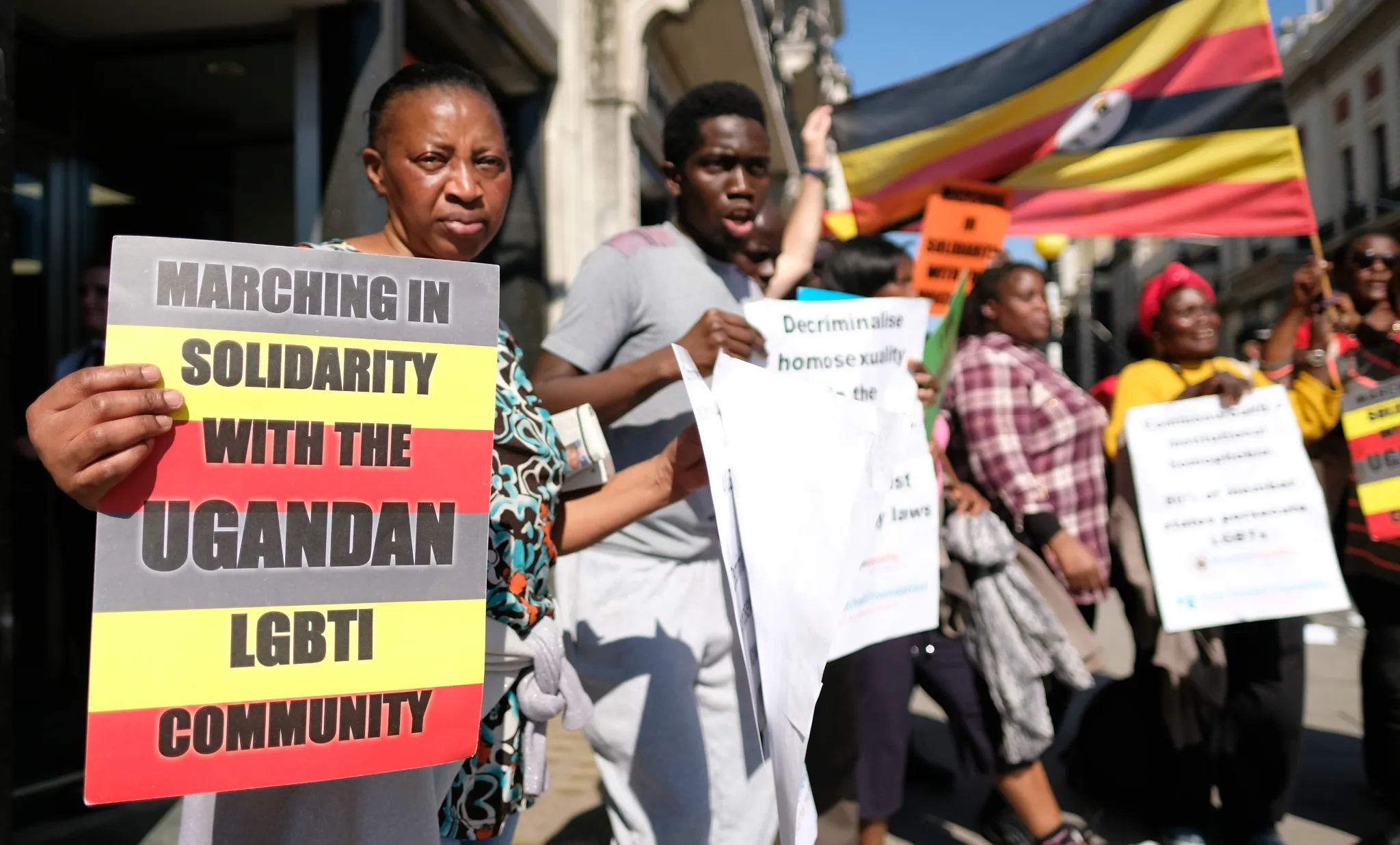The colonial legacy of homophobia in modern-day Uganda

Disclaimer: Opinions expressed in this commentary are those of the authors and do not necessarily represent the institutional position of International IDEA, its Board of Advisers or its Council of Member States.
In March 2023, the Ugandan Parliament passed the Anti-Homosexuality Act (AHA), described as one of the world’s harshest anti-LGBTQIA+ laws, with only two of 389 voting legislators openly opposing the proposal. Two months later, the Ugandan president, Yoweri Museveni, signed the AHA into law. The legislation garners broad public support, with one legislator who voted against the AHA in March later changing his vote to support it due to protests from his constituents. Uganda is not an outlier; 30 countries in Africa criminalise consensual same-sex sexual acts, and there have been recent attempts to introduce more restrictive legislation in countries such as Ghana and Kenya.
Uganda has justified the legislation by claiming a need to protect traditional ‘African family values’ from homosexuality and as a rejection of western imperialism. Notably, however, this same rhetoric about family values and the threat of homosexuality is commonly used in US evangelical churches. In contrast, the law has faced significant international backlash, with the World Bank halting new funding and the US imposing sanctions.
Despite Museveni’s claims, there is evidence that homosexuality has long existed across the African continent, stretching back to pre-colonial times; in that sense, it is not a western import at all. Understanding Uganda’s colonial history as well as the role of US evangelical churches in pushing an anti-LGBTQIA+ agenda are pieces of a large puzzle that can aid in understanding the AHA and its impact on Uganda’s democracy.
A Carefully Crafted Narrative
The criminalisation of homosexuality by the British during their colonisation of Uganda in the late 19th century has helped shape how modern-day Ugandans view homosexuality. There is documentation of various cultures across the continent, including in pre-colonial Uganda, treating gender and sexuality as continuums rather than binaries. Furthermore, while non-conforming sexualities may have been frowned upon in certain communities, they were only criminalised by the colonial rulers. Like other former British colonies, Uganda chose to preserve the English legal system following its independence in 1962, including sodomy laws. In one sense, then, the colonial legacy of homophobia and its role in ‘civilising’ and attempting to morally de-value diverse practices of gender and sexuality across various indigenous populations that did not fall under imperial heteronormative and patriarchal structures lives on.
Foreign influence fanning homophobia continues today. Although Museveni is quick to describe homosexuality as a foreign imposition, he has not acknowledged the significance of foreign influence on its legislation. There is evidence, for example, that members of US evangelical churches have been meeting with diplomats and politicians, using funds to influence laws related to sexual and gender minorities in Uganda since the 2000s. The first iteration of the Anti-Homosexual Act was introduced in October 2009 against the backdrop of a seminar organised in Kampala by members of US evangelical organisations on ‘exposing the homosexual agenda’. In April 2009, Scott Lively, an evangelical and anti-LGBTQIA+ activist from the US who was a speaker at the seminar, was invited to speak with political and religious leaders, as well as address the Ugandan Parliament. Most recently, in April 2023 members of Family Watch International (FWI), a US evangelical organisation, attended a conference in Uganda on protecting ‘African families and values’ together with President Museveni. While FWI have denied any direct involvement, sources have stated that the organisation was involved in organising the conference, as well as editing drafts of the AHA together with Ugandan legislators.
This mobilisation exacerbated already existing anti-LGBTQIA+ attitudes. In fact, language about the need to protect the ‘traditional family’ and the framing of homosexuals as predators have legitimised, in many Ugandans’ eyes, the draconian response. The World Bank’s suspension of funds at a time when Uganda is highly dependent on foreign aid only bolsters the claims that supporting LGBTQIA+ rights is a form of western imperialism and an encroachment against Uganda’s values and independence. Uganda is being pushed in two different directions by western actors; for the AHA and against it, both of which are problematic.
The Anti-Homosexuality Act and its Impact on Democracy
As Ugandan citizens are becoming more discontent with the political leadership, director of LGBTQIA+-rights organisation Sexual Minorities Uganda, Frank Mugisha, has argued that the LGBTQIA+ community are used as scapegoats by political leaders and legislators to gain public support. This may divert their attention from the problems Uganda faces, which include a rise in cost of living, crackdowns on the media and the opposition, and corruption. This tactic has widespread consequences for the LGBTQIA+ community and for Uganda’s democracy.
Political equality, one of the core principles of International IDEA’s understanding of democracy, is undermined through this anti-LGBTQIA+ legislation. Discrimination and unfair persecution of LGBTQIA+ persons create legal, political, and social barriers related to accessing essential goods and services such as healthcare, participating in political processes, and ensuring personal security - as there has been a surge in violence directed against LGBTQIA+ individuals. The new legislation also leaves room for public officials to enforce the law arbitrarily, as it can be difficult to disprove allegations. LGBTQIA+-rights organisations are unable to legally establish themselves and operate. Ensuring the protection and rights of sexual and gender minorities is one of the many crucial factors needed for individuals to be treated equally and to participate in all facets of a democratic society.




